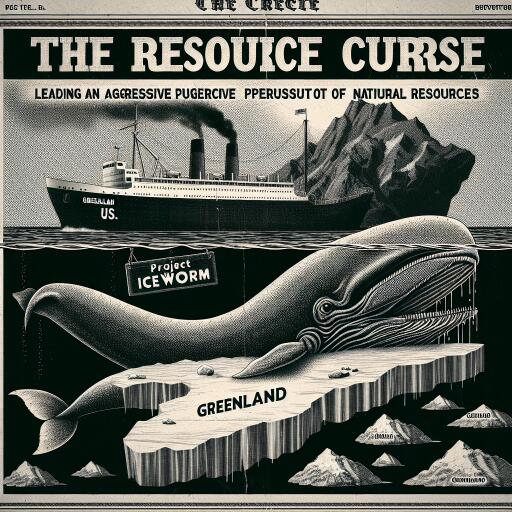
The ‘Resource Curse’ Drives Petro-Aggression and the US Left Greenland Facing Project Iceworm
The concept of “petro-aggression” refers to the tendency of nations rich in oil to engage in wars and international conflicts. Historically, countries like Iran, Iraq, Libya, and Venezuela have exemplified this phenomenon, often embroiled in disputes both regionally and with global powers such as the United States. These nations encounter challenges associated with the “resource curse,” where, despite abundant natural resources, they often experience political turmoil, higher corruption rates, civil unrest, and authoritarian governance.
The relationship between fossil fuels and militarism becomes starkly evident in the context of Europe’s reliance on Russian energy. Russia’s invasion of Ukraine is a modern instance of petro-aggression. While Russia didn’t experience a revolutionary shift in leadership, its leader, Vladimir Putin, wields his country’s oil wealth to exert political and economic pressure, particularly on Europe. Europe was significantly dependent on Russian oil and gas, posing severe energy challenges. Yet, Europe managed to secure alternate natural gas suppliers and hastened its transition to renewable energy sources, helping stabilize energy costs post-2022.
The historical “Seven Sisters,” a cartel of seven dominant Anglo-American oil multinationals in the 1950s and 1960s, controlled the global oil supply, adjusting prices by manipulating availability. However, as oil demand caught up with supply in the early 1970s, countries like Saudi Arabia, Kuwait, Venezuela, Iraq, and Iran, now part of OPEC (Organization of Petroleum Exporting Countries), were able to break free from this control, establishing their own influence over the market.
OPEC today acts more as a political consortium than an economic cartel. Despite frequent meetings and setting production targets, meaningful cooperative action within OPEC is limited. The real power rests primarily with large producers like Saudi Arabia and the inclusion of Russia in OPEC+, significantly impacting oil prices. However, in terms of climate change, OPEC strategically delays or impedes progress in international environmental dialogues, trying to maintain demand for oil and gas, which poses significant environmental detriments.
The elimination of global governmental subsidies on fuel would lead to increased oil prices and its derivatives. Such a move is economically and environmentally rational but politically challenging, as it would impact consumer costs and fuel habits worldwide. It would also spotlight the influence of fossil fuels on public health, exacerbating pollution and contributing to sedentary lifestyles.
Renewable energy offers an attractive alternative to fossil fuels concerning energy security. Unlike fossil fuels, where supply can be politically manipulated, renewables provide a more stable energy source. Once infrastructure like solar panels or wind turbines is established, energy flows depend on natural conditions beyond manipulation, unlike Russia’s energy threats during the winter of 2022. Although materials for renewable technologies could be restricted, the time frame for adjustment is longer than for traditional fuels.
“Project Iceworm” serves as a reminder of extreme military strategies tied to geopolitical ambitions post-World War II. Proposed as a nuclear missile base in Greenland, the project envisaged missiles on tracks buried under Greenland’s ice. While technically unfeasible and eventually abandoned, it left behind nuclear waste and massive fuel reserves, which were thought to be permanently entombed in ice. With climate change causing ice melt, this buried residue now poses environmental risks, potentially contaminating Greenland’s waters, raising justifiable concerns that Greenland’s government now seeks to address.





Leave a Reply